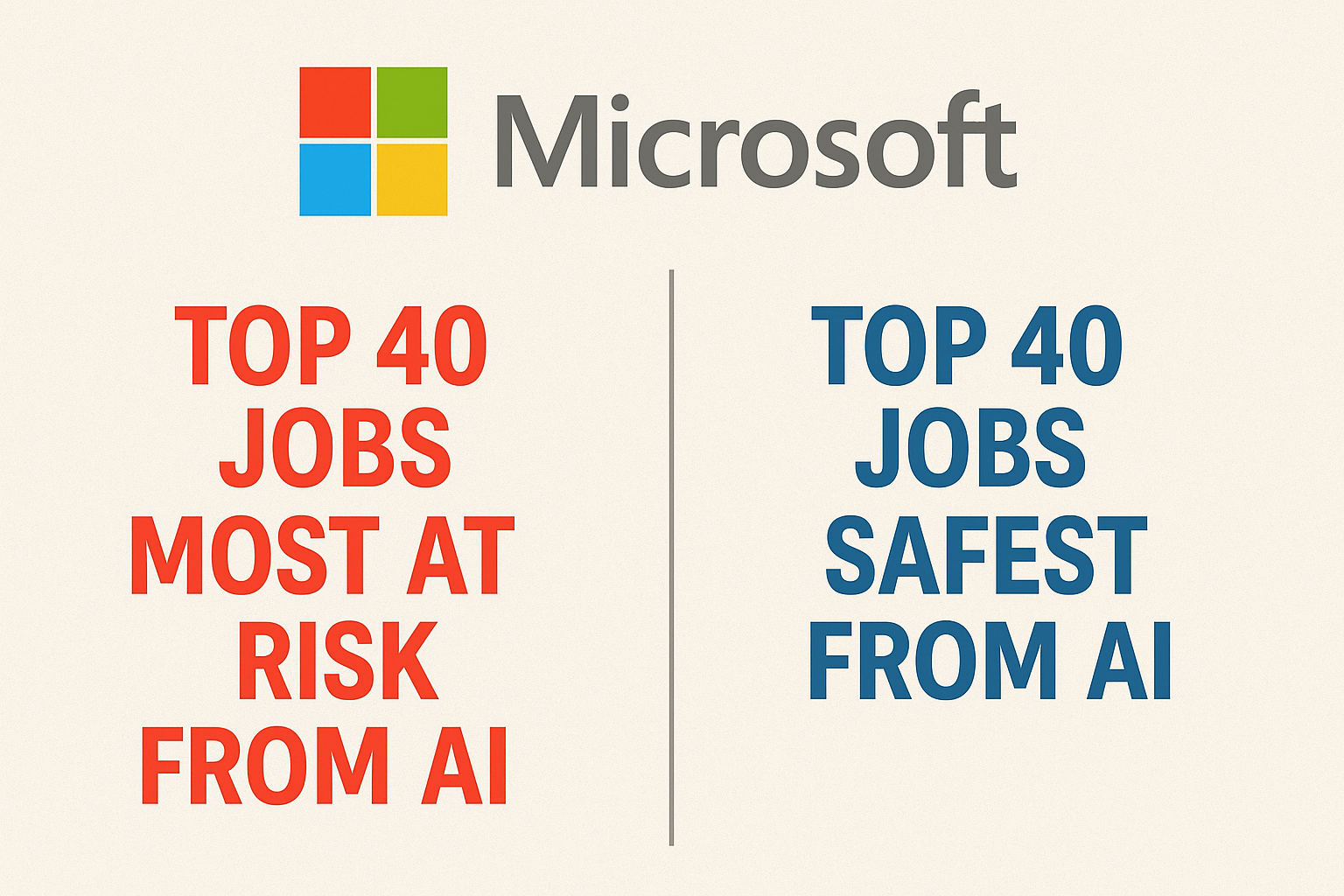CES 2026: How Emerging Technology is Shaping the Year Ahead
An expert breakdown of CES 2026, exploring how robotics, intelligent devices, and next‑gen computing are shaping technology and professional workflows in 2026.

Microsoft has published a groundbreaking report highlighting the 40 occupations most exposed to AI disruption and 40 roles least impacted. This guide breaks down the findings and offers actionable insights on navigating the evolving AI job landscape.
As AI continues to transform the workplace, Microsoft has released a landmark report outlining which jobs are most and least exposed to AI disruption. Using data from its Copilot usage across enterprise environments, the study categorizes 40 occupations where AI tools are highly applicable, and 40 where AI plays a minimal role.
40 Jobs Most at Risk from AI Automation
These roles involve tasks like content generation, summarization, data processing, and customer communication, areas where generative AI excels today. Key professions on the high-risk list include:
1. Interpreters & Translators
2. Historians
3. Passenger Attendants
4. Sales Representatives (Services)
5. Writers & Authors
6. Editors
7. Proofreaders & Copy Markers
8. Customer Service Representatives
9. CNC Tool Programmers
10. Telephone Operators
11. Ticket Agents & Travel Clerks
12. Broadcast Announcers & Radio DJs
13. Data Scientists
14. Public Relations Specialists
15. Technical Writers
16. Market Research Analysts
17. Political Scientists
18. Demonstrators & Product Promoters
19. Statistical Assistants
20. Models
21. Economists
22. Business Teachers (Postsecondary)
23. Library Science Teachers (Postsecondary)
24. Web Developers
25. Telemarketers
26. Public Safety Telecommunicators
27. Reporters & Journalists
28. Survey Researchers
29. Legal Secretaries
30. Paralegals & Legal Assistants
31. Billing & Posting Clerks
32. Court Reporters & Simultaneous Captioners
33. Compliance Officers
34. Loan Officers
35. Insurance Underwriters
36. Secretaries & Administrative Assistants
37. Credit Analysts
38. Fundraisers
39. Claims Adjusters, Examiners, & Investigators
40. Medical Records Specialists
Microsoft emphasizes that high AI applicability doesn't equate to immediate job loss but signals where AI is already heavily augmenting workflows.
40 Jobs Safest from AI Disruption
Occupations that rely on manual skills, physical presence, or human judgment remain largely AI-proof in the current landscape. Roles include:
1. Phlebotomists
2. Nursing Assistants
3. Surgical Assistants
4. Hazardous Materials Removal Workers
5. Helpers (Painters, Roofers, etc.)
6. Automotive Glass Installers & Repairers
7. Bridge & Lock Tenders
8. Cement Masons & Concrete Finishers
9. Dishwashers
10. Dredge Operators
11. Highway Maintenance Workers
12. Industrial Truck & Tractor Operators
13. Logging Workers
14. Pile Driver Operators
15. Roofers
16. Maids & Housekeeping Cleaners
17. Tire Repairers & Changers
18. Medical Equipment Preparers
19. Foundry Mold & Coremakers
20. Water & Wastewater Treatment Plant Operators
21. Orderlies
22. Massage Therapists
23. Prosthodontists
24. Ship Engineers
25. Supervisors of Firefighting & Prevention Workers
26. Elevator Installers & Repairers
27. Mechanical Door Repairers
28. Plumbers, Pipefitters & Steamfitters
29. Structural Iron & Steel Workers
30. Reinforcing Iron & Rebar Workers
31. Brickmasons & Blockmasons
32. Carpenters
33. Electricians
34. Insulation Workers (Floor, Ceiling & Wall)
35. Maintenance & Repair Workers
36. Pest Control Workers
37. Stonemasons
38. Telecommunications Line Installers & Repairers
39. Glaziers
40. Construction Laborers
These jobs demand physical dexterity, situational awareness, and emotional intelligence—attributes AI systems currently lack.
Why This Report Matters
Unlike speculative forecasts, Microsoft’s study is grounded in real-world Copilot adoption data. It reflects how AI tools are being used today, offering a practical lens on where automation is likely to have the biggest impact.
However, the study also underscores that AI’s primary role is to augment, not outright replace, human labor. Upskilling and adopting AI as a collaborative tool will be crucial for career resilience.
How to Future-Proof Your Career in the AI Era
Regardless of your profession, here are three steps to stay ahead:
1. Develop AI Literacy: Understand how AI tools work in your field.
2. Focus on Human-Centric Skills: Creativity, emotional intelligence, and strategic thinking remain irreplaceable.
3. Embrace AI as a Collaborative Partner: Learn how to leverage AI to enhance productivity rather than compete with it.
Final Thoughts
While AI is reshaping workflows across industries, the future of work remains deeply human. Recognizing where AI is likely to automate tasks—and where human skills will continue to dominate—is essential for navigating this transition.
An expert breakdown of CES 2026, exploring how robotics, intelligent devices, and next‑gen computing are shaping technology and professional workflows in 2026.
A thoughtful exploration of how modern AI tools are reshaping professional productivity in 2026, with practical insights, real world scenarios, and an honest look at limits and tradeoffs.
Looking to supercharge your productivity? Explore our comprehensive guide to the top 10 AI productivity tools offering free trials in 2026. From intelligent writing assistants to automated project management, discover which AI tools can save you hours every week. Get detailed comparisons, pricing breakdowns, and expert tips to choose the perfect tools for your workflow.
